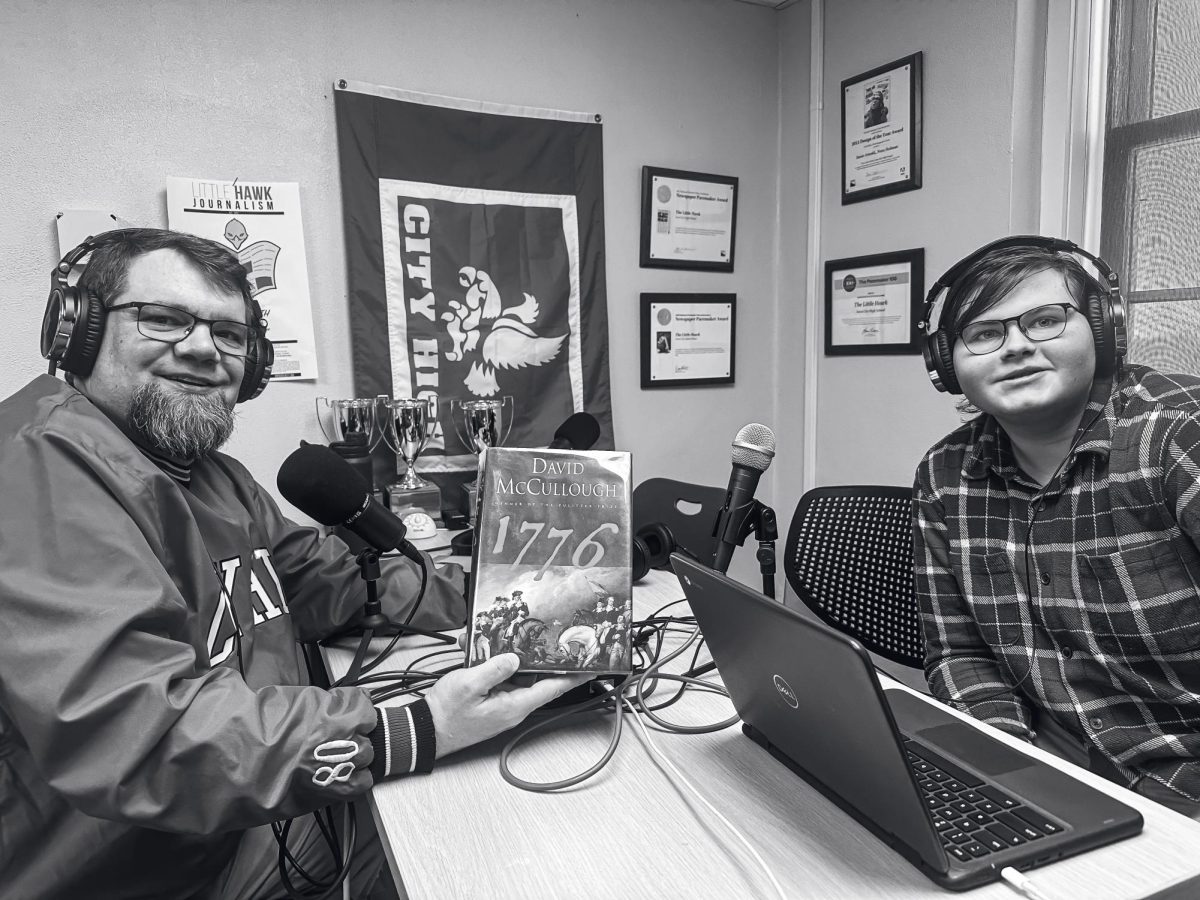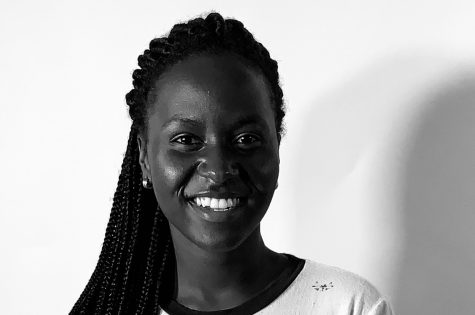Let’s Talk Business
Maisha Sila ’20 in his barbershop holding his hair clipper. Sila became the family barber changed when he moved from Grand Rapids, Michigan, to a Broadway apartment in Iowa City in the summer of 2013. Sila transitioned from being a family barber to cutting hair for everyone in his neighborhood.
November 15, 2019
City High’s Own Barber
The red and white carpets, the black wood-framed mirrors in place on the clean white walls of the room, and the bright orange-red chairs on the edge of the space—all this detailed decoration comes from the mind of Maisha Sila in order to make a basic room look like a professional barbershop.
However, Sila’s business did not start off with all its success. Rather, it began in a small bathroom cutting his father’s hair in the 4th grade in 2011. During that time, Sila’s mom was his dad’s barber. When his mother became pregnant, she wasn’t able to cut Sila’s dad’s hair. Sila recalls a phone call from the hospital asking his father to go see the babies, because his mom had just delivered them. His dad needed a haircut, so he asked Sila to cut his hair. However, his father was not pleased with the haircut, so he asked him to cut it a second time.
“When I first cut his hair I left a patch of hair in the back of his head,” said Sila. “About a week later, he asked me to do it again and I got it right, so from then on he just kept coming back every two weeks. When my brother was about four months my parents asked me to cut his hair and I did. Then it spread to my whole family, cousins, brothers, and uncles.”
Being the family barber changed when Sila moved from Grand Rapids, Michigan, to a Broadway apartment in Iowa City in the summer of 2013. Sila transitioned from being a family barber to cutting hair for everyone in his neighborhood.
“Where I lived, there were no barbers, so I would cut hair for my classmates, neighbors, and friends,” Sila said. “I became their barber. I started getting more interested in cutting hair. I remember I started taking it [more] seriously in middle school. I got rid of the Walmart clippers my mom gave me in sixth grade and I got my first real clippers from Sally’s. That was the beginning of my journey.”
In the beginning, Sila never charged anybody money. He was just a friendly neighborhood barber giving his classmates and family haircuts. He recalls just enjoying helping his friends and family. Later, things began to take a different turn.
“I remember at the end of 2013 this client—he was my friend’s father—he came over because he needed a haircut for an interview. I gave him a haircut and it was [really] good so he gave me $5,” Sila said. “When he gave me the $5, I don’t know why, but that motivated me. That’s when I realized, ‘Oh my gosh, I’m a barber!’ That was the first time I actually felt like a barber after two years of cutting hair.”
When Sila and his family relocated to a different house, he felt as if the bathroom was becoming too small, so he asked his mom for a room in the house dedicated for him to cut hair. She gave it to him and the business blew up from there.
“I just wanted to see how big I could make it,” Sila said. “I had saved up to about $500 before we moved to a bigger place. I bought a table, mirrors, and new clippers. I just wanted to look professional with it, even though I was young.”
Sila customized the entire room to create an atmosphere that would draw customers in.
“My shop—it doesn’t feel like a barbershop,” Sila said. “It feels like a place where people just come in to have a good time. They also get to see their favorite person, which is me.”
Sila believes that people’s support catalyzed the success of the shop. The relationship and connection that he created with his clients fostered the support.
“It was my [first] client that made it bigger than it was,” Sila said. “I remember when my first client came into the shop, they were like, ‘Whoa, this is a whole shop. Are you serious?’ They just took it and [elevated] it [through] their support. There are a number of good barbers out there. I also have people who live closer to [other] barbershops, but they will drive 20 minutes or more just to come to my place.”
Outside of cutting hair Sila, is a varsity football player and a track runner. He can be seen on the football field with the number 20 on his jersey. However, sometimes, there just aren’t enough hours in the day and he has to choose between one passion or the other.
“It is one of the most complicated parts of life, because I have so much love for cutting hair but also playing football, which takes up about 90 percent of my time,” said Sila. “There are times where I have to sacrifice football or cutting hair.”
During Sila’s sophomore year playing football, he initiated a schedule that would assist him to balance school activities and his professional life. He determined that during the season, he would work more on weekends and less on weekdays and get at least one or two clients in after Friday home games. All that would leave him with little to no free time, since the little time he did get after playing football, he spent cutting hair.
“The reason why deciding is so hard is because cutting hair used to be a part-time job and having to maintain all the clients is hard now because everybody needs a haircut,” Sila said. “For track, it was just certain times I skipped practice to cut hair, and I got in trouble with the coaches a lot. Being in love with cutting hair got me in trouble.”
Sila had launched a successful business, but it became extremely busy and overwhelming. He needed to create a successful schedule that would assist him to balance school and work. That is when he established an appointment system for him and the clients.
“In the beginning, there used to be a lot of people in the shop, but being a teenager I can’t just always be in the shop the whole time,” Sila said. “People now just call me or make an appointment through this website. On the website, I put my available time[s] and anyone can click on it to see my schedule. The clients can see the hours that I’m available and the hours that I’m not. “
Sila’s goals have also helped him prioritize his education. Through trial and error, he has created multiple schedules that would allow him to complete homework. He knows his plans for the future and will not allow anything to distract him.
“What I want in life is to become a businessman,” Sila said. “School is the key to that at this point. Even to become a barber, I have to be in school first. I’m not going to become a professional barber if I don’t succeed in school. Without school, I’m nobody but a street barber.”
Owning a business, especially at a young age, includes numerous responsibilities. The work that one puts in determines whether the business grows into an establishment that is successful or not. Sila sees the benefits of creating his own barbershop, knowing that he is his own boss and that he is the creator of all that he owns.
“The feeling is priceless!” Sila said. “No matter how much you make [or] no matter how much you don’t make, just [understanding] the fact that you are your own boss and you make your own schedule is a feeling that makes it [feel] better than any other.”
Advice Sila would give to anyone striving to initiate their own business is to not be afraid.
“I remember buying my first clipper and it was $42. I put a lot of thought into it,” Sila recalls. “‘Should I do this or not? Is this important?’ You should never be afraid of trying to do something big just because of your age. I feel like you can do anything.”
The person who instilled the value of ownership in Sila is his uncle. He would always give Sila life advice through quotes. Sila recalls in 2012 when his uncle told him, “Life is a game and you’re going to lose some and you’re going to win some but don’t forget to [proceed] so that you participate.”
Sila did not understand what his uncle meant by participating, but his uncle told Sila that he was already participating.
“He told me, ‘What you got right now is way more important than someone who makes $30 per hour or more,’” Sila recalls. “‘It does not matter how much they make, they’re still working for somebody, and they can always get fired. You got something that [prevents] you from getting fired. You can control the whole thing. Even though you’re not making anything right now, your still winning because you have ownership.’”
Now, Sila is thankful for and understands the advice given to him by his uncle. He has developed and is continuing to do so with his barbershop business. He also recognizes what his business exemplifies to his community.
“Nobody thought I would be able to handle it, so it feels good but not just for me, [but also] for my family and my community,” Sila said.
Although Sila has established his legitimacy in being a good barber, he still constantly receives doubts from some of his first-time clients.
“I actually appreciate those clients that doubt [my talents],” Sila said. “Those doubts challenge me. They just make me want to do even more because now you sit on my chair and I just got to prove to you that I got it.”
One challenge that Sila experienced was learning to cut different textures. Sila recalls dealing with a client who believed he could not handle his kind of hair.
“I remember in 2016, [I got] my first white client with curly hair. It was hard for me because it was different hair,” Sila said. “That was my most challenging [job], but now I’m comfortable with it. The client did not believe that I could do it, because they saw that I mostly cut Black people’s hair.”
To further his education, Sila plans to attend one of the two top beauty schools in Iowa, which are Capri College and LaJames.
“I might end up a[t] Capri, because Capri is more known for barbering, but LaJames is closer to me than Capri,” Sila said.
Sila hopes to further his education in order to pursue his passion of getting to barbering.
“It’s not just a job, it’s also it’s a way for you to connect with people,” Sila said. “Every time you give someone a hair[cut], you get to know them and you get to have that conversation of who you are and who they are.”
The Finer Clothes
Markeece Johnson graduated from City High in 2018. He has aspired to own his own company and become his own boss ever since he was in middle school.For as long as he can remember, he always wanted to own his own company and be his own boss. His dream finally came true when he created finer StreetWear Co., located just off of Highway 1.
“I just knew I didn’t want to want to work for someone,” Johnson said. “I don’t like being told what to do. I want to be my own boss, [so then] I could tell myself what to do.”
In the beginning, he did not know exactly what kind of business he wished to create. However, his 2018 Civil Rights and Historically Black Colleges trip to the South invigorated Johnson when he observed the clothing shops of Clark, Atlanta, Morehouse, and Spellman.
“In Atlanta, there was a lot of black-owned businesses as far as clothing,” Johnson said. “They inspired me to do something like that in [Iowa City].”
He also credits his love and passion for fashion with inspiring him to begin his clothing business.
“I figured that I like to dress, I like the latest shoes and clothes, so why not start a clothing business?” said Johnson.
As high school ended, Johnson began taking classes at Kirkwood Community College, but decided to discontinue. Being the manager of Culvers, the fast-food restaurant located in Coralville, and working 40-plus hours while trying to manage six classes in college became difficult.
“It just wasn’t working out and I had no [passion] for school anymore,” said Johnson.
Johnson decided to take quick action on building his business.
“It wasn’t working out so I said to myself, ‘I’ve got to start this business,’” said Johnson. “I feel like, why would you prolong something? Just get it going! So that’s what I did.”
However, in the beginning, he did not get the support of everyone, especially not his mother. She did not want Johnson to begin Finer StreetWear.
“I kind of did it behind her back because she didn’t want me to do it,” Johnson said. “She just was always doubting me and saying, ‘It isn’t going to work,’ so I just did it. The only person that believed in me when I first started out was my grandma.”
Johnson also has the support of his sister SaRhonda Johnson, who majored in business at Mount Mercy University. The two siblings give each other business ideas and motivate one another in their business ventures.
“She is more of the person who wants to teach about financial literacy. I want to do sales and [business management],” said Johnson. “We basically motivate each other.”
To keep himself motivated and not permit the opinions of others to affect him, Johnson continuously reminds himself of the goal of ownership he’s had since middle school.
“I remind myself, ‘You said you want to be your own boss, so you can’t stop yet,’” said Johnson. “You got to keep going, no ‘and[s]’ or ‘buts.’’’
With everything in place, Johnson began cultivating business plans. He did research and found a realtor who assisted him in finding the right place of business. Originally, Johnson found a place in downtown Iowa City, but it was too expensive, so he decided on a different location.
“The spot I got, located off of Highway 1, is so hidden that I don’t even like it,” Johnson said. “I’m not resigning the lease, because I’m going to be at the malls next month for Black Friday. If that goes well, I’m going to stay at the mall.”
Johnson’s store will be at the Coral Ridge Mall in Coralville for Black Friday Weekend from Thursday to Sunday between Old Navy and Abercrombie and Fitch.
“The store at the mall is so big but [I want] to take Finer Streetwear global, everywhere,” Johnson said.
Johnson believes that his store will become successful because of the uniqueness of his clothing. Most of the stores at the mall sell athletic wear while his is more streetwear, something he feels Iowa City has not seen at that magnitude.
“My clothing is way different,” Johnson said. “I never saw that when I go to the mall. I looked around every store; I’ve never seen anything of the same [kind] that I have.
To promote his business, Johnson uses social media platforms as well as newspaper coverage.
“I gave a lot of free products to people so they can promote me, and use Facebook and Instagram,” Johnson said.
At the moment, Johnson’s employees consist of his brothers and his cousins, but he anticipates to make Finer StreetWear Co. an establishment that creates job opportunities for youth, especially high-school students.
“I am trying to talk to Fredrick Newell, [an iJAG teacher], about starting a youth entrepreneur group that recruits teenagers who want to start [their] own businesses,” Johnson said.
The Shoe Game
As JayDaVonyae Hickman ‘20 walks the hallways of City High, one can’t help but notice the vibrant colors intertwined with complex and intricate patterns on his shoes. He is one of the captains of the City High football team and is also known to the student body as the person who sells shoes to the school. Hickman’s love for shoes began with observing and admiring the shoes of his brothers.
“I just always wanted a pair of their shoes and they just bought for me,” Hickman said. “Shoes are like candy to a baby.”
His enthusiasm for shoes inspired him to begin buying sneakers on various apps such as Kick X, Go App, and Nice Kicks and then sell them for twice the price.
“For example with Yeezys [a shoe brand by Kanye West], you buy them for $200 when they first drop, then they get sold out,” said Hickman. “You can resell for like $1000, so you’re making $800 in your pocket. You could either buy some more shoes or just keep your money.”
To be successful in the business, one has to be quick when getting the sneaker off the website.
“On the website or [app], when it is dropping, you just have to be there,” Hickman said. “It has a drop time on something; as soon as that drop time hits zero you submit. If they say ‘Oh, sorry,’ [then] you’re too late.”
The shoes Hickman wears act as a promotion for his business. When different students notice a sneaker that he is wearing, they ask him where he bought the shoes. That is the moment Hickman uses to begin selling the sneakers.
“Once you get a shoe that everyone would like, it starts a business right there,” Hickman said. “[People] keep coming, [asking], ‘Do you have this pair of shoes?’ I just try to keep getting more and more shoes for other people.”
However, Hickman is not the only student selling shoes in the City High hallways. There is competition. There are multiple students trying to get the most popular shoes to their student body consumers.
“I’m trying to get better at business by buying better shoes and outsell[ing] other competition,” Hickman said.
As a sneakerhead, a person who loves and collects shoes, there are times when he wants to keep some of the shoes that he may be selling. When he is shopping and buys multiple pairs of shoes, he keeps a pair that he wants, then resells the others.
“Sometimes there are times when I want to keep shoes, but if I know the shoes are going to sell for a lot more, I’m going to sell it,” said Hickman.
Nevertheless, Hickman still believes that popular sneakers are extremely overpriced, with sneakers such as The Air Max 97 Silver Ballet costing $304 on Stock X, a shoe selling website.
“They’re overpriced because people want them,” Hickman said. “They can sell them for any [price] and people will get them because it’s fashion. That’s what the trend is now: shoes.”
Ja’Korey Walker, a City High teacher and shoe enthusiast, advises students to be responsible with their money.
“If you are considerable enough financially to be able to do it, then spend your money how you want to,” said Walker. “Just make sure your priorities are in order first. Don’t go buy a new pair of shoes if you haven’t paid your rent.”
Hickman is not certain if he will expand his shoe selling business later in the future, but he plans to major in business when he attends college.








































